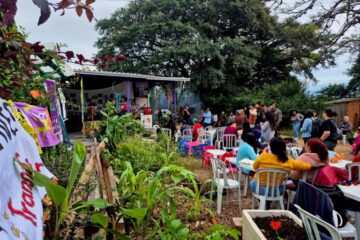Capire was launched in January 2021, complete with a website and social media profiles, through the efforts of the World March of Women to build internationalist grassroots feminist communications. It has been only one year since then, but it feels like so much more. We have been organizing content related to decades of struggles, because we have been able to count on the intense participation of the militant women of the WMW and ally organizations, such as La Via Campesina, Friends of the Earth, and others involved in the “Strengthening Grassroots Feminisms” project. We have therefore collectively built a portal with text, audio, and video content by women who are organizing in Africa, the Americas, the Middle East and North Africa, Europe, Asia, and Oceania.
Capire, which means “to understand,” has brought voices, experiences, and political views by grassroots feminist movements from around the world to the conversation. It has brought them closer together, opened up new frontiers, and strengthened references of women who are struggling out on the streets, in networks, in the countryside.
To understand the attacks of capital against life through women’s struggles, in one year since our launch, we have published 153 pieces, including interviews, analyses, videos, experiences, and feminist cultural expressions from 43 countries. The challenges that feminism faces in each of these places are specific, as they have their own particular history, culture, context, and background. But with Capire the connections between lived experiences become clear. Moreover, they show how necessary it is to strengthen internationalist feminism and the strategies of feminist economy as anti-systemic answers toward the end of patriarchal and racist capitalism.
Women organizing all around the world have struggled in 2021 to sustain life, face imperialism, poverty, and violence that became increasingly deep due to the Covid-19 pandemic and the attacks of transnational corporations against their bodies, territories, and communities. They have fought for food sovereignty, peace, and demilitarization, for autonomy, climate justice, and feminist economy that puts life on center stage. Over the course of 2021, Capire has consolidated its position as a tool to build this international grassroots feminism.
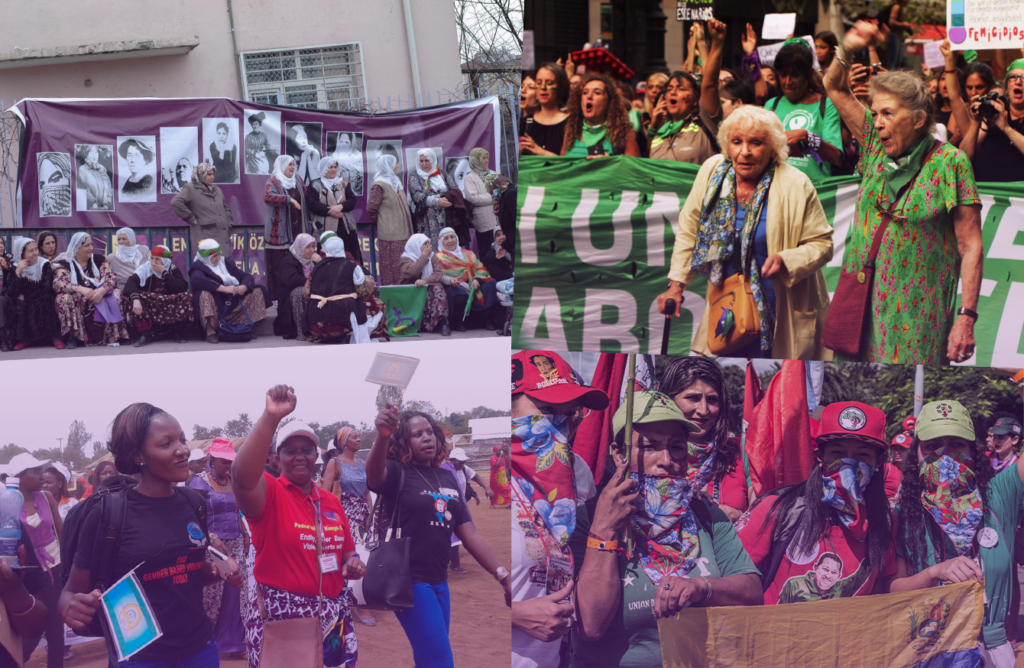
We have organized pictures of these struggles in four online galleries. On March 8, we launched a collection of 133 photographs of demonstrations for International Women’s Struggles Day. On April 17, International Day of Peasant Struggles, we published archival photos by La Via Campesina, Friends of the Earth, and the World March of Women portraying women’s primary role in building food sovereignty. On May 1, we launched a poster gallery of anti-imperialist feminism to change the world, in which women from 12 countries and territories responded to our call for posters, in collaboration with the International Peoples’ Assembly (IPA) and the International Week of Anti-imperialist Struggle. And in October, as part of the preparations for the 12th International Meeting of the World March of Women, we looked back at all previous meetings, with pictures and stories told by militants who have been building the movement for more than two decades.
A Year Resisting
We launched Capire on January 6th, 2021, introducing pathways of feminist resistance against colonialism, imperialist blockades, transnational corporations, large estates, racism, and violence; and also pointing to alternatives for feminist economy, democracy and people power, food sovereignty, and peoples’ self-determination. Women have come a long way, and their demonstrations, more than just occasional events, are part of broad processes to change lives and society. Understanding the world through feminist voices is also acknowledging the processes of grassroots feminist movement building, such as education, internationalist solidarity, and feminist communications.
With this in mind, we aimed to elevate the voices of organized women everywhere and, through their views, report on the achievements and challenges of processes of struggle. We started the year with preparations for big March 8 demonstrations, with our first international webinar, “Challenges of Grassroots Feminism,” with a panel including Yolanda Areas Blass (La Via Campesina), Karin Nansen (Friends of the Earth), Sophie Dowllar, and Nalu Faria (both from the World March of Women), when Nalu argued that “we are assigned the same task women had in 1917 Russia, when they started the Russian Revolution by fighting against hunger and war.” The following month, we met again to share our assessment of the mobilizations and the tasks we saw necessary to organize feminist resistance and solidarity around the world.
In March, we also celebrated the memory and seeds of struggle of Honduran leader Berta Cáceres. We featured the previously unpublished transcripts of Berta Cáceres’ speech at the 7th International Workshop on Emancipatory Paradigms, held in Havana, Cuba, in 2007. We published her words in writing and audio recording on the day that marked five years since her brutal political assassination. Her legacy remains alive in the struggle of the Lenca people, in Honduras, and also at the “Berta Cáceres” International Feminist Organizing School, which brought together 135 sisters and comrades for three months. At Capire, we covered and produced syntheses of the events that took place every two weeks at the School. This way, we helped to record its memory and amplify the reach of the knowledge and experience collectively accumulated in this space of international feminist organizing, which adopts a grassroots political education process.
According to the Indian militant Archana Prasad, “when capitalism and fundamentalism come together, we have a really highly lethal combination.” To understand the struggles against these intertwined systems, we shared perspectives on the coup in Sudan and Myanmar, the elections and constitutional processes in Chile, the demand for plurinationality in Guatemala, the national strikes in Colombia, and the huge peasant strikes in India, among other processes. We also published critical perspectives on the advances of authoritarianism in Turkey, the Philippines, and Brazil.
Authoritarianism advances in connection with militarization, different forms of fundamentalism, and war. From internationalist feminism, we are alert and have denounced the appropriation, by militarization, war, and occupation agents, of the feminist discourse that fights fundamentalism. The situation is Afghanistan and bordering countries is a good example of it. “If it’s not with the headline anymore, that’s when the hard work starts. That’s when our women will need their international sisters to raise their voice,” an Afghan sister told Capire.
In Palestine, there is a continuous struggle against Israel’s imperialist occupation, against poverty and exploitation. The Palestinian people resists every day against criminalization. We stand up for the freedom of Khitam Saafin and the end of the persecution against six human rights organizations that have been classified as terrorist organizations by the state of Israel.
These are organizations that are committed to protecting and advocating for our people’s safety, liberty, and right to live in a just society on our own land.
Union of Palestinian Women’s Committees
Feed the World
2021 has also marked 25 years since La Via Campesina pledged food sovereignty as a political principle, not only for peasants, but for anti-capitalist movements that struggle for an equal society. Capire published articles on the struggle for food sovereignty every day of combined action for this agenda. Miriam Nobre, of the World March of Women, argues that the principle proposed by La Via Campesina in 1996 shows us how “disrupting alienation from what we eat implies thinking of how household labor and care work is organized.” In preparation for International Day of Peasant Struggle, Capire published an interview with Pancha Rodríguez, of CLOC-La Via Campesina, who told us about the history of popular peasant feminist movement building in the Americas.
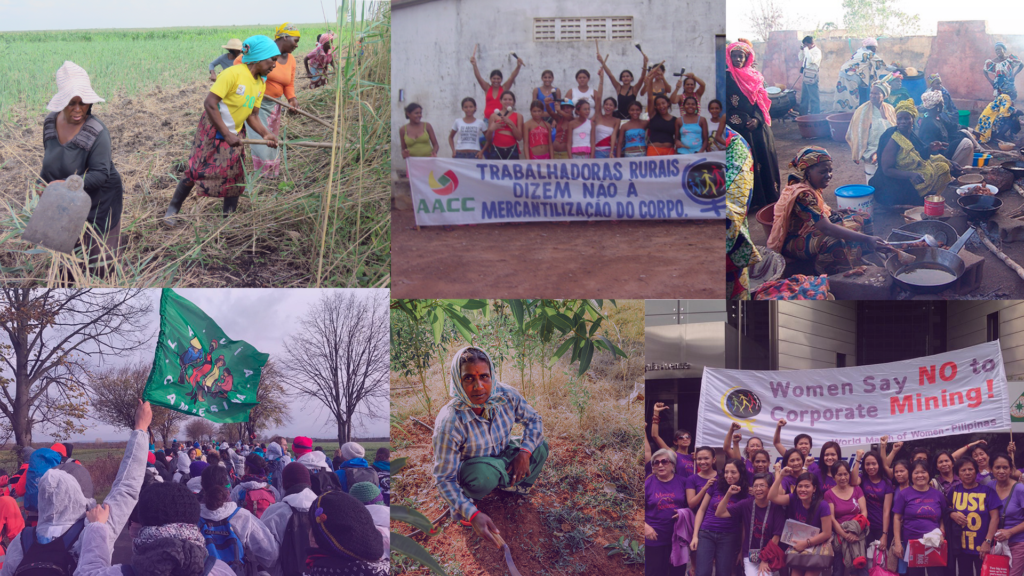
Feminist economy is a movement-building strategy. In Asia, it is a tool used by women to secure food sovereignty and autonomy. On September 10, a day of struggle for La Via Campesina against free trade, we invited Geum-Soon Yoon, of the Korean Women Peasants Association, to share her views on free trade agreements that represent a battleground today in the Asian continent.
Grassroots movements have strongly criticized the corporate agenda imposed on the climate, nature, and the peoples who live in it. While the Food Systems Summit was taking place, we denounced the green economy, false nature-based solutions, and the “the rhetoric that incorporates women and agroecology into capital.” We stated that “the climate business is not the answer for the climate crisis,” critically addressing the 26thUnited Nations Climate Change Conference of the Parties (COP26). We denounced the systematic human rights violations resulting from free trade agreements, specifically the threats included in the proposed agreement between the European Union and Mercosur.
Against false solutions, we pledged that “the feminist struggle for a different organization of work and for a harmonious relationship with nature also requires a just transition in the energy model. As Karin Nansen, of Friends of the Earth International, put it, “although we need to urgently move away from fossil fuels and mega-dams, we also need to put in the center of the transition the rights of Indigenous Peoples, workers, women and communities. A just transition needs to be based on rights. We need to make sure that energy is a right and not a commodity.”
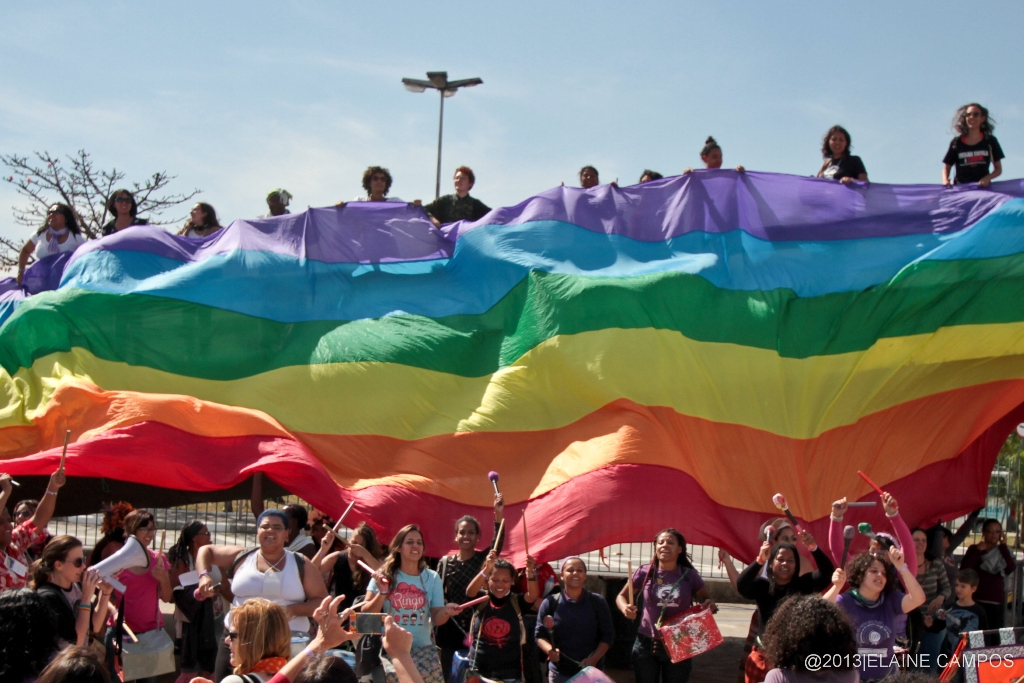
For a World Free of Racism and LGBT-phobia
In June, LGBT Pride Month, we published a series of articles on gender nonconforming members of grassroots organizations and on the feminist challenge to compulsory heterosexuality. Paula Gioia, of La Via Campesina, argued that “the problems that we have are based on patriarchy and power relations, not on what nature actually offers.” The feature film Rakifi showed us how lesbian women have to face violence and conservatism to be able to live and have relationships with whomever they want.
The following month, in July, we produced a number of articles on the struggle of Black women, past and present, in Africa and the Americas. M. Adams, from the United States, published an article on the connections between transphobia, capitalism, and racism, and pledged to challenge “violences and limits experienced by nonconforming gender people” and “change what has been historically imposed on us by the racist and patriarchal system of oppression.”
In Kenya, women shared their experiences as guardians of seeds and biodiversity. In the American continent, a discussion panel by the World March of Women brought together Black militants from ten different countries, and Capire published and translated excerpts from their speeches. Throughout the month, we published profile pieces featuring the stories of Argelia Laya (Venezuela), Marie Koré (Ivory Coast), Mekatilili wa Menza (Kenya), Carlota (Cuba), and Tereza de Benguela (Brazil).
On International Afro-Latin American, Afro-Caribbean and Diaspora Women’s Day, we learned from sisters from the Dominican Republic, where the date originated, on how seeding agroecology is part of the efforts to defend a life free of racism. The month closed with a greeting video by Graça Samo, from Mozambique, on African Women’s Day.
We continued to address the topic in August, with a two–part interview with ecofeminist professor Patricia McFadden. She argued, “feminism has to be grounded in an understanding that we, African women, have fought for our freedom in the last 500 years of racism and colonialism.” Racism and LGBT-phobia are structuring parts of the economic system that rules our lives. Fighting against them is, therefore, a structuring part of the feminist struggle, every day and every month of the year.
For a Life Free of Violence
“Inequality is a consequence of the ruling economic, social, and political system. Hunger has the stamp of capitalism,” said Galician union leader Sonia Vidal during our last 2021 webinar, as part of the preparations for International Day for the Elimination of Violence Against Women.
In Africa, women face a reality that connects patriarchal violence, land grabbing, and criminalization. They challenge forced marriage and unintended pregnancy. They bravely resist against violence, agribusiness, and the impacts of transnational production and the monoculture model. Women from the Philippines shared their experience organizing and supporting survivors of prostitution. “None dreamt to be in prostitution, but many things happened to us before we got to this place.” All over the world, women have faced the challenges of the Covid-19 pandemic, which has led to increasing sexual and domestic violence and aggravated inequality.
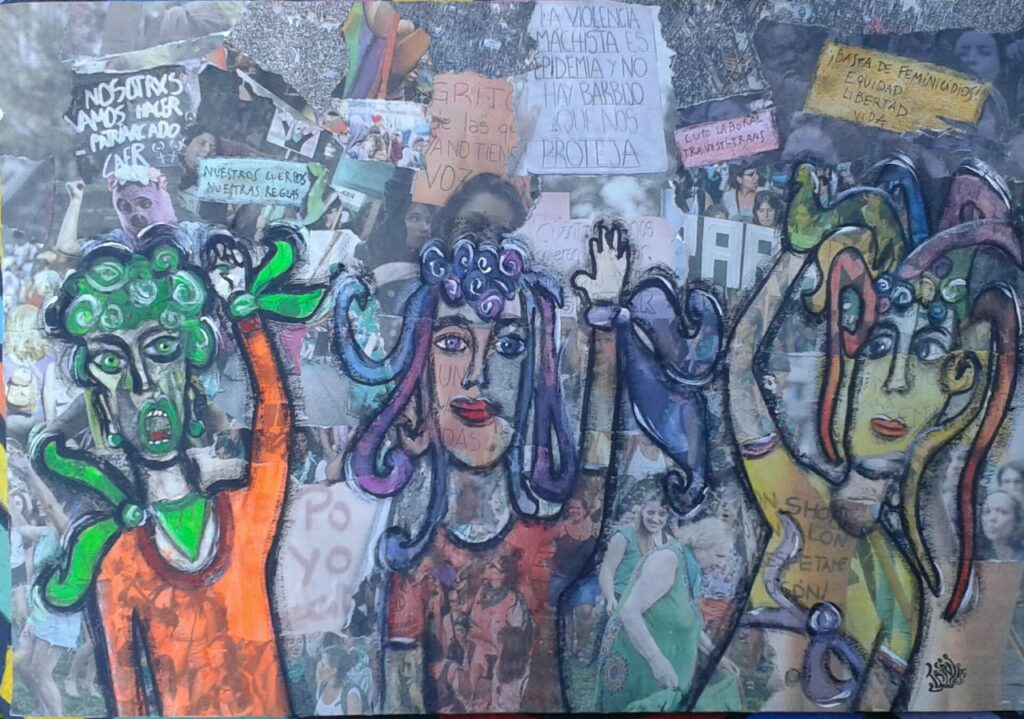
Violence against women have multiple expressions, and all of them create the inner workings of the capitalist system, which is a system of war and domination. When we face violence, we affirm that we want to be free women and sovereignty peoples! Fighting demilitarization of their territories, Kurdish, Saharawi, and Palestinian women remain on the front lines, sustaining life and demanding freedom. For the women of the Grassroots Global Justice Alliance, the only solution for US militarism and occupation is to end them.
Another World Is Possible
“Art arises from our capacity of imagining and projecting different situations from those we are living in the present,” Ana Chã told us. In our culture section, we published 12 different pieces, most of which with previously unpublished translations, because we believe that art and culture are also ways to promote change. “Poetry is a release for the soul”, the Saharawi poet Al Khadra taught us. And as the Egyptian writer Nawal Saadawi wrote, “words should not seek to please, should not hide the wounds in our bodies, the shameful moments in our lives. Sometimes words shock us, give us pain, but they can provoke us to face ourselves, to question what we have accepted for thousands of years.”




